Podcast
Questions and Answers
What is the primary function of money according to the definition?
What is the primary function of money according to the definition?
- A unit of account
- A standard of deferred payment
- A medium of exchange (correct)
- A store of value
Which of the following items has NOT been used as money?
Which of the following items has NOT been used as money?
- Computers (correct)
- Cocoa beans
- Seashells
- Gold
What is the name of the institution responsible for administering the South African currency and setting monetary policy?
What is the name of the institution responsible for administering the South African currency and setting monetary policy?
- The Ministry of Economic Development
- The Department of Finance
- The South African Reserve Bank (correct)
- The National Treasury
What is the term for the measure of money that is defined solely on the basis of the function of money as a medium of exchange?
What is the term for the measure of money that is defined solely on the basis of the function of money as a medium of exchange?
What is included in the M1 measure of money?
What is included in the M1 measure of money?
According to the Bible, what is the root of all evil?
According to the Bible, what is the root of all evil?
What is M2 equal to?
What is M2 equal to?
What is the ultimate characteristic of an ideal medium of exchange and store of value?
What is the ultimate characteristic of an ideal medium of exchange and store of value?
What is the major challenge with trading via bartering?
What is the major challenge with trading via bartering?
What is the function of money in a monetary economy?
What is the function of money in a monetary economy?
What is the unit of account in a money economy?
What is the unit of account in a money economy?
Why is money also a store of value?
Why is money also a store of value?
What is M3 equal to?
What is M3 equal to?
What is the advantage of using money as a medium of exchange?
What is the advantage of using money as a medium of exchange?
What is the relationship between the function of money as a medium of exchange and as a unit of account?
What is the relationship between the function of money as a medium of exchange and as a unit of account?
Why does the use of money as a unit of account enable us to calculate the opportunity cost of a good or service?
Why does the use of money as a unit of account enable us to calculate the opportunity cost of a good or service?
What is the purpose of the Reserve Bank accommodating banks at a penalty rate of 0.5 percentage points above the repo rate?
What is the purpose of the Reserve Bank accommodating banks at a penalty rate of 0.5 percentage points above the repo rate?
What is the direct result of changes in the repo rate?
What is the direct result of changes in the repo rate?
What are open market transactions used for?
What are open market transactions used for?
What is an example of a non-market oriented instrument used by monetary authorities?
What is an example of a non-market oriented instrument used by monetary authorities?
What are the underlying assets eligible for repos?
What are the underlying assets eligible for repos?
What is the relationship between the repo rate and the cost of credit in the economy?
What is the relationship between the repo rate and the cost of credit in the economy?
What is the primary advantage of using money as a store of value?
What is the primary advantage of using money as a store of value?
What is the main objective of the South African Reserve Bank?
What is the main objective of the South African Reserve Bank?
What is the result of a credit transaction between the Treasury and the Central Bank?
What is the result of a credit transaction between the Treasury and the Central Bank?
How do commercial banks create money?
How do commercial banks create money?
What is the effect of foreign trade on the domestic money supply?
What is the effect of foreign trade on the domestic money supply?
Why is money not always a good store of value?
Why is money not always a good store of value?
What is the name of South Africa's central bank?
What is the name of South Africa's central bank?
What happens to a country's money supply when its gold and foreign exchange reserves increase?
What happens to a country's money supply when its gold and foreign exchange reserves increase?
What are the four major areas of responsibility of the South African Reserve Bank?
What are the four major areas of responsibility of the South African Reserve Bank?
What is the opportunity cost of holding any money balance?
What is the opportunity cost of holding any money balance?
What is the effect of capital inflows on the domestic money supply?
What is the effect of capital inflows on the domestic money supply?
What is an example of a currency that lost its functionality as a store of value?
What is an example of a currency that lost its functionality as a store of value?
What are the two most important functions of money?
What are the two most important functions of money?
What is the primary objective of monetary policy?
What is the primary objective of monetary policy?
Who formulates and implements monetary policy in South Africa?
Who formulates and implements monetary policy in South Africa?
What is the main market-oriented policy instrument used by the South African Reserve Bank?
What is the main market-oriented policy instrument used by the South African Reserve Bank?
What is the purpose of repurchase agreements (repos) between the Reserve Bank and its banking clients?
What is the purpose of repurchase agreements (repos) between the Reserve Bank and its banking clients?
What is the cash reserve requirement for banks in South Africa?
What is the cash reserve requirement for banks in South Africa?
What is the name of the committee responsible for taking decisions on the appropriate monetary policy stance in South Africa?
What is the name of the committee responsible for taking decisions on the appropriate monetary policy stance in South Africa?
What is the term used to describe the various rates of interest in the economy?
What is the term used to describe the various rates of interest in the economy?
Flashcards are hidden until you start studying
Study Notes
Introduction to Money
- Money is an essential institution in the economy.
- Money serves as a medium of exchange, unit of account, and store of value.
Definition and Characteristics of Money
- Money is anything generally accepted as payment for goods and services or in settlement of debt.
- The marginal value of money does not decrease when additional units are added.
- Characteristics of money:
- Uniformity: one part has exactly the same characteristics as another.
- Divisibility: can be divided into infinitely small units.
- Durability: does not corrode.
- Portability: high value-to-weight ratio.
Functions of Money
- Medium of exchange: facilitates exchange between parties without the need for a double coincidence of wants.
- Unit of account: a common measure for stating prices of goods and services.
- Store of value: holds wealth or surplus production.
- Settling debts: can be used to settle debts in the future.
Money in South Africa
- The South African Reserve Bank administers the South African currency and sets monetary policy.
- Three measures of the quantity of money: M1, M2, and M3.
- M1: coins, notes, and demand deposits.
- M2: M1 plus short-term and medium-term deposits.
- M3: M2 plus long-term deposits.
South African Reserve Bank
- Established in the early 1920s.
- Primary object: to protect the value of the currency in the interest of balanced and sustainable economic growth.
- Functions:
- Formulation and implementation of monetary policy.
- Service to the government.
- Provision of economic and statistical services.
- Maintaining financial stability.
Supply of Money
- Created through credit transactions between the Treasury, Central Bank, and commercial banks.
- Banks also create money by lending and receiving deposits.
- Influenced by foreign trade and international capital movements.
Demand for Money
- Amount that participants in the economy plan to hold in the form of money balances.
- Opportunity cost: interest that could have been earned had the money been used to purchase bonds instead.
- Two components:
- Transactions demand: arises from the medium of exchange function.
- Demand for money as an asset: arises from the store of value function.
Interest Rates
- Prices of loanable funds (cost of money).
- Types:
- Repo rate.
- Interbank lending rate.
- Prime rate of banks.
- Fixed interest rates.
- Mortgage rates.
- Rates on government stock, etc.
Monetary Policy Framework in South Africa
- Formulated and implemented by the South African Reserve Bank.
- Decisions taken by the Monetary Policy Committee (MPC).
- Instruments:
- Accommodation policy.
- Open market policy.
- Public debt management.
- Intervention in foreign exchange markets.
Instruments of Monetary Policy
- Accommodation policy:
- Refinancing of liquidity requirements.
- Repurchase agreements (repos) between the Reserve Bank and banks.
- Open market policy:
- Purchase or sale of domestic financial assets to influence interest rates and quantity of money.
Studying That Suits You
Use AI to generate personalized quizzes and flashcards to suit your learning preferences.




